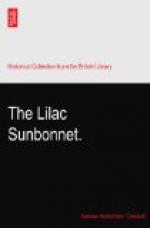Now we must take the trouble to follow in some detail the course of this small boy going to school, for though it may be of no interest in itself save as a study in scientific procrastination, a good deal of our history directly depends upon it.
As soon as Andrew was out of sight he pulled his leather satchel round so that he could open it with ease, and, having taken a handful of broken and very stale crumbs out of it for immediate use, he dropped Winsome’s parcel within. There it kept company with a tin flask of milk which his mother filled for him every morning, having previously scalded it well to restore its freshness. This was specially carefully done after a sad occasion upon which his mother, having poured in the fine milk for Andra’s dinner fresh from Crummie the cow, out of the flask mouth there crawled a number of healthy worms which that enterprising youth had collected from various quarters which it is best not to specify. Not that Andra objected in the least. Milk was a good thing, worms were good things, and he was above the paltry superstition that one good thing could spoil another. He will always consider to his dying day that the very sound licking which his mother administered to him, for spoiling at once the family breakfast and his own dinner, was one of the most uncalled-for and gratuitous, which, even in his wide experience, it had been his lot to recollect.
So Andra took his way to school. He gambolled along, smelling and rooting among the ragged robin and starwort in the hedges like an unbroken collie. It is safe to say that no further thought of school or message crossed his mind from the moment that the highest white steading of Craig Ronald sank out of view, until his compulsory return. Andra had shut out from his view so commonplace and ignominious facts as home and school.
At the first loaning end, where the road to the Nether Crae came down to cross the bridge, just at the point where the Grannoch lane leaves the narrows of the loch, Andra betook himself to the side of the road, with a certain affectation of superabundant secrecy.
With prodigious exactness he examined the stones at a particular part of the dyke, hunted about for one of remarkable size and colour, said “Hist! hist!” in a mysterious way, and ran across the road to see that no one was coming.
As we have seen, Andra was the reader of the family. His eldest brother had gone to America, where he was working in New York as a joiner. This youth was in the habit of sending across books and papers describing the terrible encounters with Indians in the Boone country—the “dark and bloody land” of the early romancers. Not one in the family looked at the insides of these relations of marvels except Andra, who, when he read the story of the Indian scout trailing the murderers of his squaw across a continent in order to annihilate them just before they entered New York city, felt that he had found his vocation—which was to be at least an Indian scout, if indeed it was too late for him to think of being a full-blooded Indian.




